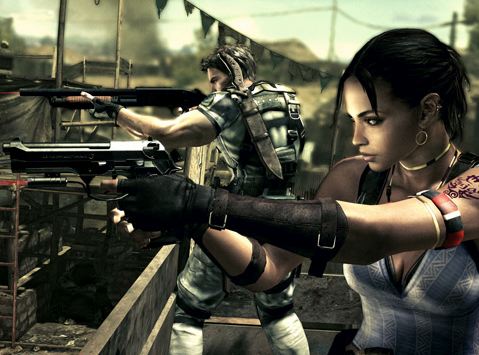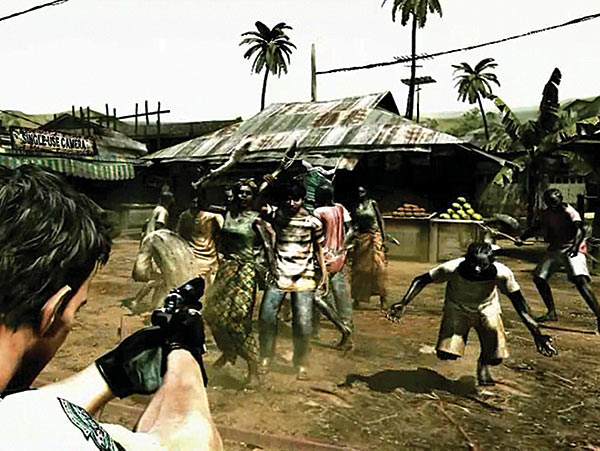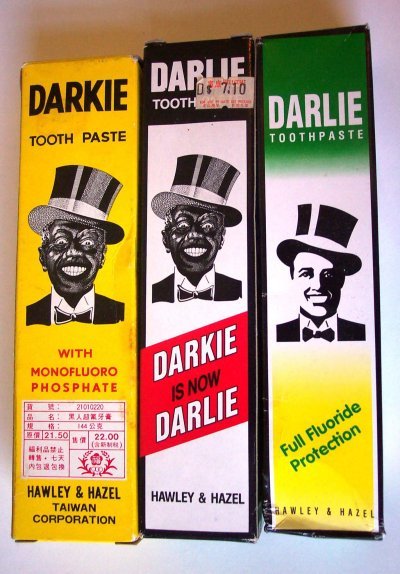Long before its scheduled March 2009 release, Resident Evil 5 (RE5), the next installment in the immensely popular and influential survival-horror videogame series, started coughing up blood…and controversy: In the narrative, a white protagonist, Chris Redfield, sets down in what appears to be an African or Caribbean country decimated by a mutant “supervirus.” Suddenly, freshly dead villagers start to revive as bloodthirsty zombies, and Redfield must slaughter them in hordes to stay alive, a la this scene, below, from the game trailer.
Perhaps Newsweek‘s gaming critic, N’Gai Croal, giving pointed regard to the clip’s images, with their precedents in racist visual history, said it most succinctly in an excellent MTV Online interview: “Clearly no one Black worked on this game.”
(Capcom, which makes the game, addressed Croal via producer Jun Takeuchi, stating that “there are Black members in the development team. We do have staff working on the game, who are aware of the historical background and we are constantly checking these kinds of things with them.” Are Takeuchi, and the people who hail his statement aware that, as opposed to making his company look better, this makes his company look worse? In other words, that with Black staff, they’re getting the kinds of results which suggest they have none?)
Even more, however, on gaming blogs, fans of the series argued, typically with contempt, that viewers were overreacting. For example, AriesXX, here, responding to one of Bonnie Ruberg’s RE5-critical Village Voice pieces:
Africa and Haiti are the two most blighted, diseased places on the planet. This makes it totally plausible that any new ‘super virus’ might originate, or at least thrive in these areas. I don’t care what race they are, the diseased among us need to be cured, quarantined, or destroyed. If a game comes out that supports that message, fantastic.
What do you think? Well, now, you can make up your own mind with the new gameplay trailer from G4. (Thanks, Kotaku.) As indicated by the pic beneath the above headline, Redfield now has a non-white colleague: Says Wikipedia, she’s “Sheva Alomar,” an agent in West Africa’s branch of the BSAA (Bioterrorism Security Assessment Alliance). (My favorite touch: Her combat-spec, coffee-colored, “biracial” skin tone.)
I think it’s racist as a tube of of Darkie toothpaste, right. (Note how the dentifrice transmorgrified, from Darkie to the meaningless Darlie, once the race charge was made.)
Croal says,
“When you engage that kind of imagery you have to be careful with it. It would be like saying you were going to do some sort of zombie movie that appeared to be set in Europe in the 1940’s with skinny, emaciated, Hasidic-looking people. If you put up that imagery people would be saying, ‘Are you crazy?’ Well, that’s what this stuff looks like. This imagery has a history. It has a history and you can’t pretend otherwise. That imagery still has a history that has to be engaged, that has to be understood. … If you’re going to engage imagery that has that potential, the onus is on the creator to be aware of that because there will be repercussions in the marketplace.”
More and more, game manufacturers are enabling gamers to modify varied aspects of the playable character’s, or avatar’s, appearance and other characteristics. For example, the follow-up to the hilarious, 2006 Grand Theft Auto rip-off Saints Row, Saints Row 2, even gives one the power to modify an avatar’s personality.
 It’d be interesting if the makers of Resident Evil 5 went this route in terms of their product. Giving gamers a playable Black lead character might blunt some of the charge that Capcom is subtly programming America’s tousle-headed youth for a circa 2015 Nigerian oil grab and the inevitable insurgency. (Or, like the shape-shifting Darkie, some might read such an accommodation as merely a naked ploy.)
It’d be interesting if the makers of Resident Evil 5 went this route in terms of their product. Giving gamers a playable Black lead character might blunt some of the charge that Capcom is subtly programming America’s tousle-headed youth for a circa 2015 Nigerian oil grab and the inevitable insurgency. (Or, like the shape-shifting Darkie, some might read such an accommodation as merely a naked ploy.)
Whether they do or not, though, I seriously doubt that N’Gai thinks there’s going to be any repercussion in the marketplace for RE5. I can’t wait to play it, personally. This has less to do with how racist its setup may appear, though, than it does the kind of trade-offs Black people typically grow accustomed to making around content of all kinds, from pornographic to religious: If I avoided racism as relentlessly as it pursues me, I’d just stay in bed all day with the shades drawn and the windows nailed shut.
March 2009 beckons. I’m going to have to get through my backlog of unfinished / unplayed games first, though…including Resident Evil 4.




2 comments ↓
Excellent writeup. The introduction of “Miss Coffee” as the sidekick has only been revealed in the last month or so. I’m assuming that to be some sort of subtle gesture towards making amends or something.
It’s interesting how, in the last several years, as video games have gone more mainstream, there seems to be more and more discussion about race.
That’s a good thing because it’s a subject that needs to be discussed. At the same time, that’s bad because, at least here in the US, the target demographic for most video games tends to be the 15-24 year old Caucasian male crowd. Not always the most open group of people to talk to about ANYTHING that might jostle their perceived place in the “Testosterone Pecking Order”.
Anyway, thanks for shedding some more light on the subject. Maybe next time you can talk about how a game with the audacity call itself “Rock Band” can have so few Black artists represented in it’s ever growing catalog. 😉
RIP – James Brown
The game is set in Africa, who lives in Africa? black people. End of a discussion that should never have happened.
Leave a Comment